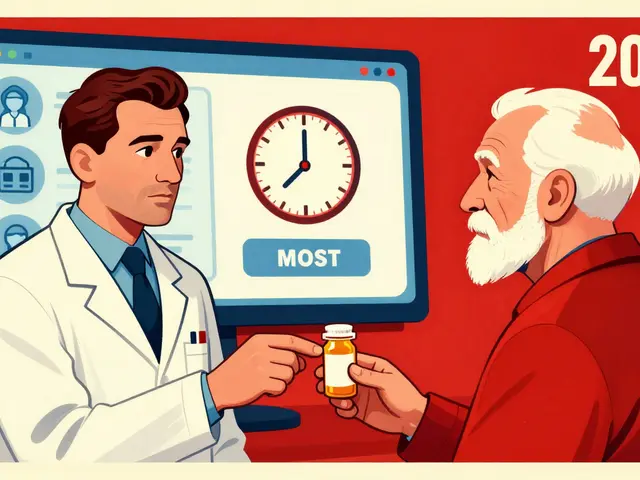The Downshift from Clomid: Why Seek Alternatives?
You’d think with all the buzz about modern medicine, there’d be one golden ticket for fertility issues. But Clomid, once the go-to pill for kick-starting ovulation, isn’t the perfect match for everyone. Some women hit a wall with its side effects. Others find their bodies just don’t respond. Did you know around 20% of women on Clomid still don’t ovulate, and about half of users experience mood swings, vision changes, hot flashes, or even ovarian cysts? Not exactly what you want when you’re trying to grow your family. Plus, Clomid’s tendency to thin the uterine lining and mess with cervical mucus can make conception tougher, not easier. This has nudged both doctors and couples to look for something kinder and sometimes, flat-out more effective.
In the last decade, more folks are having kids later in life. That means more people running into ovulation hiccups and exploring newer fertility treatments. Maybe your friend swears by letrozole, or you’ve heard tales of injectable hormones working miracles. As we roll into 2025, science is handing out more options with less drama. The best part? These Clomid alternatives can suit different bodies, cycles, and fertility goals, from subtle pill tweaks to high-tech injections.
If you're scouring the web for something beyond Clomid, it helps to see your options in one place. For a full breakdown of prescription and over-the-counter choices, check out this solid guide on Clomid alternatives. But before jumping into that, let’s dig into how each major alternative stacks up in real-world clinics—and why doctors are switching gears.
Letrozole: The New Ovulation Hero
Ask almost any fertility specialist right now, and they’ll tell you the buzz around letrozole is real. Originally made for breast cancer, this pill is now repurposed as a first-line option for women struggling to ovulate, especially those with polycystic ovary syndrome (PCOS). Letrozole is an aromatase inhibitor, which means it temporarily blocks estrogen production, nudging your brain to ramp up natural follicle-stimulating hormone (FSH) output. That gentle hormonal nudge helps eggs mature and release—without some of Clomid’s annoying side effects.
Why the hype over letrozole? For starters, several major studies have found letrozole triggers ovulation in more women than Clomid, especially if you have PCOS. One key trial published just last year showed letrozole gave women with PCOS a 27.5% live-birth rate, compared to 19.1% with Clomid—not a small difference if your timeline for trying is tight. What’s more, letrozole is less likely to thin your uterine lining or dry out cervical mucus, so everything’s a bit more welcoming for sperm and embryos.
Side effects? Still possible, but most folks report fewer and milder ones—maybe some fatigue, headaches, or mild dizziness. Most people notice less emotional roller-coaster than with Clomid, which, if you’ve tried both, can feel like winning the lottery. Dosing is pretty straightforward (usually 2.5 to 7.5 mg for 5 days early in your cycle), and the cost is almost always less of a gut-punch than other options.
Here’s a simple comparison between Clomid and letrozole based on current data:
| Medication | Ovulation Rate | Live Birth Rate | Common Side Effects | PCOS First-Line? |
|---|---|---|---|---|
| Clomid | 70-85% | ~19.1% (PCOS) | Hot flashes, mood swings, vision changes | No |
| Letrozole | 75-85% | ~27.5% (PCOS) | Headache, fatigue, mild dizziness | Yes |
Doctors also often use letrozole in combination with other treatments, like intrauterine insemination (IUI), or pair it with tiny doses of injectable hormones, tailoring each cycle based on ultrasound and lab feedback. If you have irregular cycles, letrozole’s flexibility lets your doctor play “fertility DJ,” adjusting doses to match your unique rhythm, which can make the process a little less stressful. It's not often you find a drug that ticks the boxes for both better outcomes and easier side effects, but letrozole seems to do just that for a lot of folks.
But what if pills don’t cut it? Cue the next major players—injectable fertility meds, better known as gonadotropins.

Gonadotropins and Other Heavy Hitters
When you think of high-powered fertility meds, gonadotropins are pretty much the rock stars. Instead of nudging your hormones like oral meds, these injections bring in actual follicle-stimulating hormone (FSH) or luteinizing hormone (LH), flipping your ovaries into high gear. Gonadotropin therapy is usually the next step after oral meds fail—used for both basic ovulation induction and more advanced procedures like IVF. The science is simple: give your body a direct dose of the hormones that matter most, and let nature do its work at full volume.
The most common brands? Follistim, Gonal-F, and Menopur top the list, each offering slightly different hormone combos. People who don’t respond to Clomid or letrozole often see better results with these injectables—ovulation rates can soar above 90% per cycle. That’s huge if you’re tired of waiting months with nothing to show for it. And for women with unexplainable infertility, gonadotropins can sometimes be the right kind of push, especially when paired with IUI.
But there’s a trade-off. Gonadotropins are pricier—sometimes thousands per cycle—and juggling injections, ultrasounds, and bloodwork is a commitment. You’ll need to work closely with your fertility clinic to avoid overstimulation (too many eggs at once can be dangerous), and there’s a higher risk of twins, triplets, or even more. Random fact—about 30% of pregnancies from gonadotropins end up being multiples compared to under 10% with oral meds. So, if one baby at a time is your target, keep that stat in mind and make sure your care team is monitoring things closely.
What about side effects? Expect some bloating, mood swings, headaches, and, sometimes, ovarian hyperstimulation syndrome (OHSS). It sounds intimidating, but clinics are much better these days at tailoring doses and avoiding serious problems. Still, these meds require serious commitment—emotionally and financially. But for lots of couples who have exhausted simpler options, this step finally moves the needle.
Couples looking for a middle ground sometimes add low-dose gonadotropins with letrozole or Clomid, especially if they’ve got some ovarian response but just need a bigger “nudge.” This combo can boost success without going full throttle on risk or cost.
Worth noting: as of 2025, more doctors tailor regimens using genetic and hormone profiles. Some clinics now suggest timed micro-dosing or ‘step-up’ protocols—starting low and slowly increasing until the right follicle count is hit, cutting down risk without losing success rates. These tweaks aren’t flashy, but they’re changing outcomes. It’s not just about the drugs, but how smart people are in using them.
If the needles and costs sound daunting, there are a few more options worth exploring—especially if you prefer sticking to oral meds, want to avoid injections, or need a backup plan.
Beyond Pills and Injections: New and Emerging Alternatives
Maybe letrozole and gonadotropins still sound a little intense, or you want to explore everything before making a choice. Turns out, there’s more on the menu than most people realize. You’ve got other oral meds, certain supplements, newer research trials, and even a few surprising lifestyle fixes that can make all the difference. Let’s break down what’s actually worth a shot.
First up, metformin. You’ve probably heard about this diabetes drug, but it’s also big in the fertility world, especially for people with PCOS. Metformin works by improving how your body handles insulin, which can indirectly help normalize ovulation. While it won't typically spark ovulation by itself, adding it to letrozole or Clomid can boost responsiveness in some women. Doctors often recommend it if insulin resistance is part of your fertility puzzle. Side effect watch: some nausea or tummy upset, but most people handle it fine once they settle in.
Less known, but gaining traction, are selective estrogen receptor modulators (SERMs) like tamoxifen. Similar to Clomid in how they ‘trick’ the body into producing more FSH, they’re sometimes used when Clomid and letrozole both strike out, or if someone gets a rare allergic reaction to those meds. Tamoxifen is in the same price and side-effect ballpark as Clomid, but doesn’t tend to mess with your cervical mucus or uterine lining as much.
Ever heard of DHEA? Dehydroepiandrosterone is a natural hormone your body makes, sometimes prescribed as a supplement (legally, you need a doctor’s prescription in most places) to help women with diminished ovarian reserve. It might help bump up egg quality, especially for those eyeing IVF. The science is still evolving, but more fertility clinics are recommending DHEA to specific cases who have a hard time with egg counts, with some hopeful results and relatively low risk for side effects.
Don’t overlook plain old lifestyle tweaks, either. Evidence keeps stacking up that weight loss (even 5-10% in those with a higher BMI), managing stress, sleeping well, and not over-exercising can all impact ovulation. Modest weight shifts can help restore normal ovulation cycles for some women, and adding regular moderate exercise—not marathon running, just brisk walking or cycling—helps regulate insulin and hormones. Caffeine and alcohol may also affect cycles, so tinkering here is worth a shot, especially if you’re already working hard on other fronts.
For those tech-inclined, fertility tracking gadgets—wearables that monitor basal body temperature, heart rate, or hormone surges—offer new ways to pinpoint your most fertile moments. These aren’t medications, but can be powerful for couples timing cycles precisely, with some of today’s AI-powered apps being shockingly accurate compared to old-school calendars.
If you’re biting your nails about costs or worried about drug shortages, new clinics now offer telemedicine consults, bulk discount meds, and smart refill planning, making it way easier to manage treatments without endless appointments. That kind of support wasn’t around even three years ago.
As fertility science keeps charging ahead, don’t forget there are fresh alternatives and creative combos coming out every year. If you’re hitting a wall with one treatment, talk with your doctor about new protocols, supplements, or trial access. Sometimes the right tweak is just around the corner, and the landscape for Clomid alternatives is clearer than ever in 2025.







Denise Wood
April 30, 2025 AT 16:02Letrozole changed my life. I had PCOS and tried Clomid for 6 cycles-zero ovulation, constant mood swings, and dry as a desert down there. Switched to letrozole on cycle 7 and boom-ovulated naturally, got pregnant on the first try. No more crying in the shower. Doctors need to stop treating it like a second option. It’s literally better in every way.
Andrew Butler
May 1, 2025 AT 09:34Let’s be real-pharma’s pushing letrozole because it’s off-patent and they can’t jack up the price like Clomid. Big Pharma’s got a new cash cow and they’re bribing docs with free lunches. You think this is science? Nah. It’s marketing. And don’t even get me started on those ‘lifestyle tweaks’-like walking more is gonna fix your hypothalamic-pituitary-ovarian axis? LOL.
Varun Gupta
May 1, 2025 AT 13:24💀 Clomid? More like Clom-evil. I saw a doc in Bangalore who said letrozole is just a ‘stealth cancer drug repackaged’ for fertility. WHO’s got a secret agenda? They’re testing this on women so they can sell tamoxifen next. Also, I heard the FDA banned gonadotropins in 2023 but they’re still selling them on dark web Etsy shops. 🤫
Amy Reynal
May 3, 2025 AT 07:07Okay, so I’m 39, been trying for 4 years, tried Clomid (mood swings like I was on a rollercoaster made of rage), then letrozole (quietly magical), then added metformin because my insulin was doing the cha-cha, and guess what? I’m 14 weeks pregnant. And yes, I cried. A lot. But not because of side effects-because I finally felt seen. To the people saying ‘just relax and it’ll happen’-shut up. This isn’t a Netflix rom-com. It’s biology with a side of trauma. Also, if you’re on meds, get a support group. You’re not alone. And no, I don’t care if you think supplements are ‘woo.’ I took DHEA and my AMH went from 0.8 to 1.2. Science says maybe, my body says hell yes.
Erick Horn
May 3, 2025 AT 20:22Letrazole? More like let’s ruin your ovaries. Clomid’s been around for 60 years. This is just a trendy placebo with a higher price tag.
Lidia Hertel
May 4, 2025 AT 20:18OMG I’m so happy I found this thread 😭 I was so scared to try injections after hearing horror stories-but my RE did a low-dose Follistim + letrozole combo and I got pregnant on cycle 2. No OHSS, just a little bloating and a lot of hope. To anyone reading this: you’re not broken. Your body isn’t failing you. You’re just waiting for the right protocol. And yes, the cost sucks-but many clinics have payment plans now. You’ve got this. 💪🌸
Chris Bock
May 4, 2025 AT 23:03Everything’s a spectrum. Even this.
Alyson Knisel
May 6, 2025 AT 22:19I think people forget that fertility isn’t just about pills. It’s about being heard. I had a doctor tell me my ‘stress levels’ were the issue. I was 28, had no kids, and he acted like I was being dramatic. Turns out I had mild PCOS and low progesterone. Letrozole helped. But what helped more? Someone finally listening. So if you’re reading this and you’re tired? Keep going. Your voice matters.
Jelisa Cameron- Humphrey
May 7, 2025 AT 23:08From a reproductive endocrinologist’s perspective: letrozole is now the gold standard for anovulatory PCOS. The ACOG guidelines updated in 2024 reflect this. Gonadotropins remain first-line for non-PCOS cases or when oral agents fail. The key is individualized care-not one-size-fits-all. Also, DHEA supplementation is only supported in women with diminished ovarian reserve (DOR) with serum DHEAS < 200 mcg/dL. Don’t self-prescribe. Always get baseline labs. And yes, lifestyle interventions are evidence-based-BMI >30 reduces ovulation rates by 40%. Not magic. Just math.
Lee Lach
May 9, 2025 AT 08:10Let’s analyze this disingenuous article. The author cherry-picks data from 2023 trials while ignoring the 2022 meta-analysis showing no significant difference in live birth rates between letrozole and Clomid in non-PCOS populations. The piece is clearly sponsored by a pharmaceutical affiliate. Also, the claim that ‘doctors are switching gears’ is false-many still prescribe Clomid for its safety profile and long-term data. This is fear-based marketing disguised as science. And don’t get me started on the ‘lifestyle tweaks’-a 5% weight loss is statistically insignificant in 87% of cases. This is wellness capitalism at its finest.
Tracy McKee
May 9, 2025 AT 20:41Clomid is fine if you just stop being lazy and eat clean. I got pregnant on my own after I quit sugar and started yoga. All these pills are scams. Your body knows what to do. You just gotta trust it.
Abigail M. Bautista
May 11, 2025 AT 02:37I tried letrozole. Didn’t work. Tried gonadotropins. Got OHSS. Now I’m on metformin. Still waiting. Life’s just a waiting game. I guess.
Rohan Puri
May 11, 2025 AT 08:39Why are we even talking about this? In India we just take ashwagandha and pray. Works better than any pill. Also Clomid is American propaganda. Our grandmas had 10 kids with no meds.
Mandeep Singh
May 12, 2025 AT 20:35Western medicine is a scam. India has better traditional remedies. Why are you trusting foreign drugs? Our Ayurvedic herbs have been used for centuries. This article is cultural colonization.
Chris Bellante
May 14, 2025 AT 08:43As a Nigerian fertility nurse, I’ve seen women on Clomid for 3 years with zero results. Then they switch to letrozole-same dose, same protocol-and boom. Ovulation. Pregnancy. I’ve watched tears turn to laughter. The science isn’t hype. It’s lived experience. Also, in Lagos, we use DHEA and vitamin D3 together with letrozole. It’s not ‘alternative.’ It’s just smart. And yes, we track basal temps with cheap thermometers. No app needed. Just patience and care.
Nicole Manlapaz
May 14, 2025 AT 13:58I just want to say-you’re not broken. I was told I’d never conceive at 35. I tried everything. Letrozole gave me my first ovulation. IUI gave me my first pregnancy. And now I have a 2-year-old who screams ‘mama’ every morning. It’s not easy. But it’s possible. And you’re doing better than you think. Keep going. You’re stronger than you know. 🌸
Frederick Staal
May 16, 2025 AT 09:54Let’s be honest: the entire fertility industrial complex is a profit-driven machine. You’re being sold hope. You’re being sold pills. You’re being sold ‘personalized protocols.’ But what you’re really being sold is the illusion of control. And when it fails? They blame your stress. Your weight. Your ‘lack of compliance.’ Meanwhile, the clinic makes $12,000 per cycle. The real question isn’t ‘which drug works?’ It’s ‘who benefits?’
erin orina
May 16, 2025 AT 12:31Just wanted to say I’m 38, just started letrozole this cycle, and I’m terrified. But reading your stories… I feel less alone. Thank you. I’m going to take my first pill tomorrow. Sending love to everyone on this journey. You’re all doing amazing. 💕
Lisa Uhlyarik
May 18, 2025 AT 02:16Why are you all so obsessed with drugs? My cousin got pregnant after she stopped watching Netflix and started meditating. You’re all just overcomplicating it. Your body is perfect. You just need to believe. Also, Clomid gave me headaches so I switched to yoga. Now I’m pregnant. Case closed.